Women, Then and Now Project
About this Collection
Women, Then and Now Project reinterviewed some of the women legislators whose experiences were captured by Washburn University faculty members in 1990-92. The current interview explores their experiences in office as they look back on their years of service. The questions posed probe their perceptions at the beginning of their service and at the end. In addition, there are several short conversations with small groupings of the women who were interviewed in which they compare their experiences. A report synthesizing and providing context for these legislators’ service as described in the interviews can be accessed here.
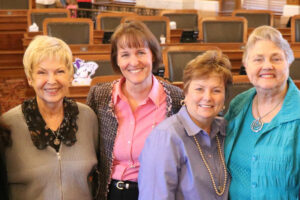
Steel Magnolias – Conversation with former Representatives Martha Jenkins, Ginger Barr, Nancy Brown, October 18, 2019
Interviewed by Joan Wagnon
This conversation among four female legislators describes their experiences as friends and colleagues in the Kansas Legislature in the 1980's and early 1990's. The climate of the Legislature at that time encouraged women to make friendships across the aisle without worrying about political party. Republican women had formed a group called the Steel Magnolias, saying "we're all different but we come together when we need to get something done." The particular incident described in this short conversation was an attempt to defeat a budget proposal in retaliation for an abortion amendment. News coverage of the incident stated, Show More"GOP Women's gang of Eleven shows men their chauvinism can be costly." The conversation concludes with memories of their legislative service and favorite issues.
Highlight -- a short excerpt from the interview
Show Less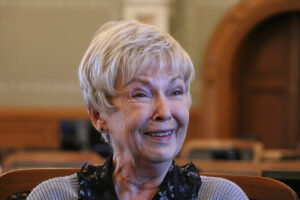
Interview of Nancy Brown, October 18, 2019
Interviewed by Joan Wagnon
This interview with Nancy Brown covers not only the ten years of her legislative career but her volunteer work on the local (township), state, and national levels. Her philosophy of focusing on the issues rather than party positions sometimes created problems for her within the Republican caucus. Her focus on local issues, from the Stanley Sewer Crisis to annexation to the Blue Valley Recreation Commission created legislative battles but left lasting change that she feels benefited her rural constituencies. She worked on a variety of women's issues, such as expanding funding for mammograms and discussed in detail Show Morehow the legislature was changing its attitude towards women members. She explains how she managed her family, particularly her school-age children during her time in the legislature. The interview concluded with Dr. Annie Miller of the Washburn University Political Science Department leading Brown through a discussion of personal identity and its impact on her legislative career. Show Less

Interview of Rochelle Chronister, January 22, 2015
Interviewed by Burdett Loomis
Rochelle Chronister quickly rose to a leadership position after her election in 1978. She was responsible for recruiting many Republican women to the legislature. She talks in the interview about her job as Assistant Majority Leader and recruitment. Her description of how the Appropriation committee works shows how she became interested in SRS from handling their budget, and that led to becoming Secretary of SRS under Governor Graves. There is one example of her research skills in developing a new program on mediation. She downsized SRS as Secretary and worked on changing the culture of Show Morea highly bureaucratic organization. She worked to ensure that her female colleagues were included and worked across the aisle on numerous measures. She concludes the interview by talking about her family and how they responded to her being away so much. She once chartered a plane to get home in time to attend her daughter's tea. That Chronister was an effective legislator and politician is clear from reading this interesting interview. Show Less
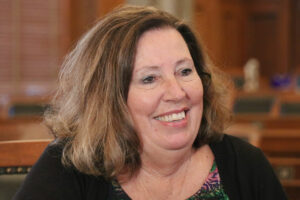
Interview of Darlene Cornfield, October 9, 2020
Interviewed by Patty Clark
Former State Representative Darlene Cornfield reflects on her six sessions in the Kansas House representing the 90th House District (Sedgwick Co.). She describes the issues that come back year after year and the challenges faced by a new legislator. She identifies the difficulties faced by conservatives at a time when the Republican party was undergoing an ideological change. Cornfield observes that the citizen legislature is most effective but did not favor term limits.
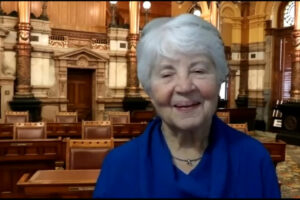
Interview of Sheila Frahm, November 13, 2020
Interviewed by Joan Wagnon
In this 2020 oral history interview, former Kansas State Senator Sheila Frahm reflects on her time in elected office from local school board to U.S. Senate. This interview was conducted on ZOOM with Frahm at her home in Arizona and the interviewer in Topeka. The interview begins with a discussion of an earlier (1991) interview conducted by a Washburn University professor that covers much of Frahm's background and her interest in education issues. It covers her life in Topeka in the early years of her service and how her family moved to Topeka with her for the session each year Show Moreand why. Frahm provides a unique point of view on the relationships between Governors and the Legislature. She discusses her decision to leave the legislature and run for Lt. Governor with Bill Graves and her subsequent appointment to fill a U.S. Senate vacancy when Bob Dole decided to run for President. This interview includes a segment during which Frahm talks about several issues in which she was involved: community colleges and out-district tuition and triple-trailers. During the interview Frahm reflects on her identity as a western Kansas legislator and how her roots, her up-bringing, shaped others' perceptions of her legislatively. She saw the years during which she served in the State Senate as very productive, citing school finance in 1992 and advances in higher education as two important policies that were enacted. The interview concludes with Frahm's reflections on the civility of the body, the importance of relationships to accomplish your goals, and advice to prospective candidates. Show Less
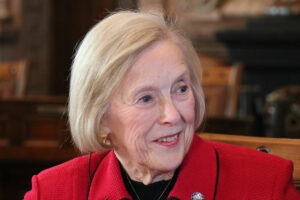
Interview of Audrey Langworthy, October 18, 2019
Interviewed by Joan Wagnon
This 2019 oral history interview of former Kansas State Senator Audrey Langworthy covers her first race to unseat long-time State Senator Norman Gaar, a race she won in 1984 and her four subsequent terms--a total of 16 years. Some of her new colleagues in the Senate steered her to the Assessment and Taxation Committee which she ultimately chaired and loved. Langworthy's tenacity comes through in the interview as she talks about the steep learning curve when she got to the Senate and to the Tax Committee. She received death threat letters after her vote on capital punishment which she sent Show Moreto the Kansas Bureau of Investigation. This interview includes an interesting discussion of strategy developed to pass the 1999 transportation plan and Langworthy's role in it. Her depiction of her views on leadership, her "personal first bill" on the Oregon Trail, and the Bi-state Cultural District bill are worth reading for insight into how Langworthy operated in the Senate and how the increase in the number of women Senators changed the culture of the Senate. Show Less
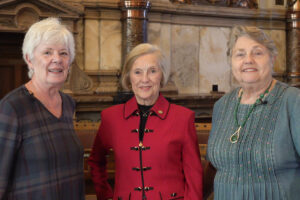
The Skirts – Conversation with former Senators Audrey Langworthy and Sandy Praeger, October 18, 2019
Interviewed by Joan Wagnon
The participants in this short Statehouse Conversation, former Kansas State Senators Audrey Langworthy and Sandy Praeger, reflect on the changes in attitudes toward women senators during their service. Three new Republican women were elected to the Senate in 1984. Because they shared an office, they frequently arrived in the Senate chamber together, causing their male colleagues to remark, "Here come the Skirts!" Langworthy and Praeger had both taught school, served on the same committees, and had also been elected to their respective city councils prior to running for the Senate. By the mid-1990's the number of women had increased significantly Show Moreso the differences were not so stark as before. Show Less
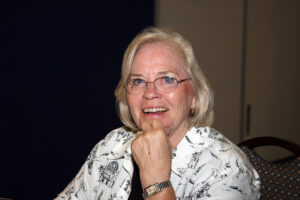
Interview of Janis Lee, October 14, 2019
Interviewed by Joan Wagnon
Former State Senator Janis Lee's 2019 oral history interview covered her 22 years in the Kansas Senate as well as several years on the Kansas Court of Tax Appeals (formerly the Board of Tax Appeals and later returned to that name). The interview covers many topics, including how she campaigned in a rural district that increased in area over those 22 years, driving as much as 45,000 miles in an election year. Lee developed expertise in tax issues that was important to the agriculture community and in funding rural schools. Water supply was an important issue in her district, Show Moreas was adapting federal regulations so they would work in rural communities. She witnessed the shift to a more conservative legislature and more anti-abortion legislation. Funding for schools dominated most sessions.
Highlight -- short excerpt from the interview
Show Less
The Ladies Room – Conversation with former Senators Lana Oleen and Janis Lee, October 14, 2019
Interviewed by Joan Wagnon
The Ladies Room is a short Statehouse Conversation with former Kansas State Senators Janis Lee and Lana Oleen facilitated by former State Representative Joan Wagnon. The conversation centers around the culture of the Kansas Senate when Lee and Oleen served their first session in 1989. Altogether, eight new women Senators began their service that year. Lee and Oleen rose to leadership positions in their respective caucuses.

Interview of Lana Oleen, October 14, 2019
Interviewed by Joan Wagnon
Lana Oleen, who represented Riley and Geary counties in the Kansas Senate, discusses her four terms in the Senate (1989-2004). Oleen focuses on the leadership approach she developed working within a closely divided caucus and during periods of divided state government. She cultivated her natural inclination to bring people together to find solutions to constituents’ problems and built upon skills first developed as a classroom teacher to rise through the ranks to become Senate Majority Leader.
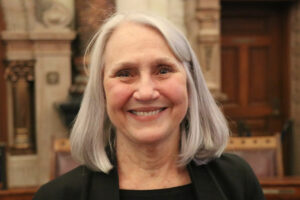
Interview of Nancy Parrish, October 23, 2020
Interviewed by Patty Clark
This 2020 oral history interview of former State Senator Nancy Parrish is packed full of information about people and policy between 1980 and 1992 in the Kansas Senate. She was one of the first, if not the first Democrat women elected to the state senate. Parrish talks about establishing her own identity after filling the unexpired part of her husband's term and winning the seat three more times while fostering a child, adopting a child, and attending law school at Washburn University. Her relationships with Republican senators allowed her to be effective in passing or shaping legislation. Show MoreParrish served on the conference committee to negotiate the 1992 school finance bill. Parrish also discussed her two years as Secretary of Revenue and working with Senator Gus Bogina to pass legislation to provide for purchase of a large-scale computer system for collecting taxes at the Department of Revenue. Parrish offers opinions on the importance of the separation of powers in the constitution, from her perspective as a former legislator, an executive branch administrator and a judge. For Parrish, each of these experiences has been a learning experience. She concludes the interview by expressing concern about the loss of "camaraderie" among legislators. Show Less

Triple Date – Conversation with former Senators Alicia Salisbury and Nancy Parrish, October 23, 2020
Interviewed by Joan Wagnon
In this short 2020 Statehouse Conversation two former Kansas State Senators, Nancy Parrish and Alicia Salisbury recall their first year serving in the Kansas Senate. In 1984 Shawnee County elected three women Senators: Nancy Parrish, a Democrat; Jeannie Hoferer, a Republican, and Alicia Salisbury, a Republican. Martin Hawver, a reporter for the Topeka Capitol Journal at that time, referred to them as a "Triple Date." Two of the three former senators discuss briefly what it was like in the Senate in 1985 when they took their seats and how they were treated by their male colleagues. Salisbury and Parrish saw Show Morewomen's issues as "people issues." Salisbury relates being removed from a conference committee on an education bill because she "did what's best for the schools she represented." Show Less

Interview of Marge Petty, September 11, 2020
Interviewed by Patty Clark
This oral history interview of former Senator Marge Petty covers her 12 sessions in the State Senate representing a Topeka district (Senate 18). Petty talks about why she registered as a Democrat, challenged a sitting Republican woman Senator in the 1988 election, and won. She discusses specific issues such as the investigation of the KPERS venture capital investments with other Senators, healthcare issues, foster care, and education. The interview also chronicles her career after leaving the legislature in 2000. Petty talks candidly about losing that last election, after which she began working for the Kansas Corporation Show MoreCommission. Later, she decided to move back to Dallas and worked to secure an appointment from President Obama as a regional representative of Health and Human Services. Petty describes the process of going after that appointment. This is a wide-ranging interview that shows the energy and skills Petty brought to the public arena. Show Less

Interview of Jo Ann Pottorff, October 9, 2020
Interviewed by Patty Clark
Former Kansas State Representative Jo Ann Pottorff describes her best legislative work as getting the Parents as Teachers program passed. With her background in education, she saw opportunity for this program to make a difference for children. Pottorff’s policy interests were education, financing the work of the legislature, and funding schools. In order to pursue those interests, she secured an assignment to the House Appropriations Committee early in her tenure. Over the course of her service in the Legislature her interests broadened. Pottorff was assigned to the Joint Committee on State Building Construction, which she chaired for a Show Moretime, and as a member of that Committee was involved in the renovation of the Capitol building. At the national level, Pottorff worked with National Conference of State Legislators (NCSL) and the Women's Legislative Network which allowed her to meet other women in office and to travel internationally, to Korea, Japan, Taiwan, and Germany. Pottorff describes the changes in the culture of the legislature during her years of service (1985-2012). She notes the rise in partisanship and inter-party divisions evidenced by the fact that she was often targeted in a Republican primary election when she sought renomination. Show Less

Interview of Sandy Praeger, October 18, 2019
Interviewed by Joan Wagnon
Former Kansas legislator Sandy Praeger describes in this 2019 oral history interview how she never anticipated having a career in politics when she ran for the Lawrence City Council. Praeger looks back on her service in the Kansas House and Senate and her time as the elected Kansas Insurance Commissioner. While in the Legislature, Praeger represented a Lawrence district that she described as being a place where "it was easy to run more on policy issues than any kind of political ideology." Praeger ran for the State Senate after one term in the House. Praeger built her Show Morebackground on health issues, including insurance, in the Legislature serving on the Public Health and Welfare, Children and Families, and Insurance and Financial Institutions committees. She recalls stepping into the role of committee Chair during her first session in the Senate and presiding as Vice President of the Senate many years later. Praeger's background on health policy came to the forefront while the country was implementing the Affordable Care Act which she strongly supported as Kansas Insurance Commissioner. Show Less
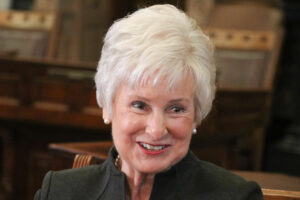
Interview of Alicia Salisbury, October 23, 2020
Interviewed by Patty Clark
Former Senator Alicia Salisbury grew up in a political family--both father and grandfather served in the legislature--so her sixteen years of service as a Kansas Senator continued the family tradition. She also was a serious legislator who believed in community service as witnessed by the numerous boards and committees on which she served, both volunteer and elected. Salisbury's driving interests were improving the economy of Kansas and bringing growth in wealth to her community and state. Salisbury's 2020 oral history interview chronicles her work ethic. With her children no longer at home, she had the Show Moretime and the interest to dive into a wide assortment of issues, from workforce development, to interstate banking, to telecommunication reform, to a blue ribbon panel on workers compensation. Salisbury worked long hours and focused on constituent services. She boldly asked for the committees that interested her and championed changes where necessary. Salisbury succeeded in changing the Labor and Industry Committee into the Commerce Committee to handle everything from economic development strategies to workers compensation. She tackled tough issues with a sense of humor and the skills of collaboration learned as a volunteer leader. This interview describes her determination, her commitment, and her legacy to the state of Kansas as Vice President of the Senate. Show Less
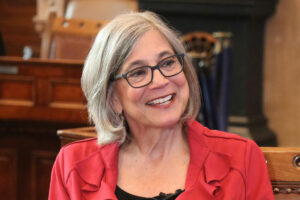
Interview of Susan Wagle, December 18, 2020
Interviewed by Alan Conroy
Former Kansas legislator Susan Wagle describes her interest in politics as "evolving over time." In this interview she candidly talks about her journey to become the first woman to break the glass ceiling and be elected to the top leadership position in the Kansas Senate. And she held onto the Senate Presidency for two terms. Wagle cites several events as having shaped her decision to run: getting a free pregnancy test and learning it was from an abortion clinic; seeing the huge property tax bills resulting from classification and reappraisal and how they angered people; enactment Show Moreof bingo legislation that affected he business negatively--all of which led to awareness that government could have an impact on families and businesses. Once in the Legislature, Wagle developed legislation to control property taxes. When an incumbent left a Senate seat, Wagle moved to the other chamber. She formed alliances in both the House and Senate with a group of conservative legislators enabling her to attain leadership positions. Wagle authored the Woman's Right to Know Act and solicited support from a prochoice Senator to get it passed--the first pro-life legislation. As a committee chair Wagle felt she had greater ability to pass bills that were needed. The issues she addressed ranged from protecting ground water from corporate hog farming, to tax-limiting measures, to ethics. Wagle credits her many years of service to listening to her constituents on issues such as taxation, quality of life, and education. In the closing of this interview, Wagle talks about her last year with COVID which she describes as "horrific" and disruptive. She reflects on her accomplishments changing the Board of Healing Arts and dealing with the Bioscience Authority. Show Less
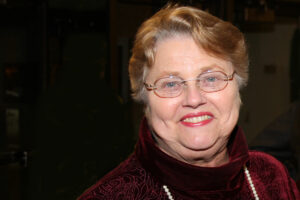
Interview of Joan Wagnon, May 11, 2018
Interviewed by H. Edward (Ed) Flentje
Ed Flentje's interview of former Representative Joan Wagnon is lengthy and complete, covering her 12 years in the state legislature, 4 years as Mayor of Topeka, and 8 years as Secretary of Revenue. She talks about the work of the House Taxation Committee in implementing legislation after passage of a constitutional amendment classifying property for tax purposes. Wagnon discusses the 1992 school finance lawsuit which produced massive change in the school funding formula, including how the concepts were developed and what strategies were used to get them passed. The interview covers in detail how the House Democrats interacted with Show MoreGovernor Finney in the 1991 session, when Finney vetoed the major tax bill and the Supreme Court found the school finance formula to be unconstitutional. Wagnon served as facilitator for the Children's Initiatives Committee which Speaker Marvin Barkis chaired. That committee produced fourteen bills that affected children and families. Economic development issues are discussed in the last part of the interview which links Wagnon's legislative interests to her work as Mayor of Topeka: neighborhood revitalization, spreading the tax base from city to county for Washburn University and the library, and developing economic development infrastructure to attract growth and new business for Topeka. She also discusses some of her eight years as Secretary of Revenue, particularly her involvement with the Streamlined Sales Tax.
A version of this interview is also posted on KansasMemory.org, the website of the Kansas Historical Society. Show Less


















